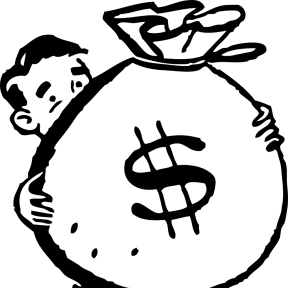HAPPINESS- The Psychology of Wealth. Considerable efforts have been made to decode the milionaire mind.

KEY POINTS-
- Attempts have been made to determine if there are common psychological traits among rich people.
- The willingness to take risks and extreme self-confidence have each been linked to the very wealthy.
- Negative behaviors have been reported in studies of children of privilige.
- Research has shown there to be little correlation between wealth and levels of happiness.
Thoroughly woven into the tapestry of American culture has been the mythology or cult of the millionaire, a term which originated in France (by Disraeli in 1826) but was rarely used in the United States until the late 19th century. The word was reportedly first used in America in a newspaper obituary for Pierre Lorillard I, founder of the tobacco empire. “Mr. Lorillard was a ‘millionaire,’” the obit read, this was made possible by his giving people something they could “chew that which they could not swallow.”
There were only three millionaires in the United States in 1861, but it was a much different story a century later. There were about 100,000 millionaires in the country in 1961 (versus 27,000 in 1953), enough to suggest that the wealthy comprised a legitimate subculture. With that many rich Americans (and many more wanting to become one), efforts were made to try to figure out if there was a common, defining psychological trait among the tremendously wealthy and, if so, what it was.

In his 1961 study of six multimillionaires (American oilman J. Paul Getty, British retailer Simon Marks, Greek shipping magnate Aristotle Onassis, German industrialist Alfred Krupp, British takeover artist Charles Clore, and French textile tycoon Marcel Boussac), Welsh journalist Goronwy Rees found only one strong commonality: an inclination to roll the dice and, after winning a hand or two, the guts to let it all ride. “It is the willingness to accept…huge risk,” Rees wrote in his Multimillionaires: Six Studies in Wealth, “that psychologically distinguishes the multimillionaire.”
Another book published that same year, The New Millionaires and How They Made Their Fortunes, found a somewhat different common denominator among the super-rich—extreme self-confidence. Other factors one would think mattered quite a bit when it came to making a fortune—place of birth, how much money one’s father had made, even education level—were of little or no importance, the authors of this study found. Whether the secret to getting rich was a great capacity to take risks or a profound faith in oneself, one thing seemed clear—the wealthiest of the wealthy did it on their own, unlike your run-of-the-mill millionaire.
According to a growing number of experts, however, many children of privilege had a much different psychological profile. The first real “poor little rich kid” syndrome was diagnosed in the late 1970s; its proponents, such as Burton Wixen, author of Children of the Rich, argued that a “golden ghetto” dwelled within American wealth culture. Narcissistic, self-centered, and shallow, these waifs were just as deprived as kids growing up in utter poverty, psychologists treating them maintained, labeled “emotional zombies” by the prominent psychoanalyst Roy Grinker, Jr. Whether the cause was absentee fathers, alcoholic mothers, or just too high expectations, a fair number of rich kids were spending much of their time taking drugs, having sex, and getting acquainted with the judicial system, precisely what many disadvantaged inner-city teens were doing.
In the 1980s, social critics and psychologists began to argue that children of privilege often suffered from what one of them cleverly termed “affluenza.” Catching this affliction, the dark side of "too much much," seemed to follow a fairly predictable path. First was the obligatory summoning on their 18th or 21st birthday to Morgan Guaranty or another trust fund officer, during which the young man or woman was informed that he or she was, in short, filthy rich. (Because their worth was often more than they suspected, the young man or woman would sometimes ask to see the actual money, as if the trust fund officer had a few million in cash in his desk drawer.)
The next stage was the wild buying spree, clothing at first but soon escalating to bigger ticket items like first-class seats to the-scene-of-the-moment purchased at the airport before the next plane to Paradise left. The last and most dangerous phase was a gradual loss of identity and general aimlessness, experts maintained, often associated with the consumption of alcohol and drugs and involvement in sundry other reckless behavior to fill the void. The lack of interest in a career or inability to even hold down a job was considered a primary cause of affluenza, according to psychologists and psychiatrists. A disproportionate number of young rich called themselves “movie producers” despite having precious little to show for it.
As hedge funders began to rule the rich roost in the mid-00s, the spread between the mega-haves and the have-a-lots would grow into a chasm, putting the former into a league of their own. According to research, however, all that money didn’t do much to make the super-rich any happier than the rest of us sitting in the coach section of life. A study published in the Journal of Personality and Social Psychology in the mid-1990s found that money had little relationship to happiness, confirming the findings of a similar study done about a decade earlier. Genetics, these and other studies have shown, have played the biggest role in determining one’s level of happiness, with the size of one’s financial portfolio not a major factor.
- Questions and Answers
- Opinion
- Story/Motivational/Inspiring
- Technology
- Art
- Causes
- Crafts
- Dance
- Drinks
- Film/Movie
- Fitness
- Food
- Παιχνίδια
- Gardening
- Health
- Κεντρική Σελίδα
- Literature
- Music
- Networking
- άλλο
- Party
- Religion
- Shopping
- Sports
- Theater
- Wellness
- News
- Culture
- War machines and policy

